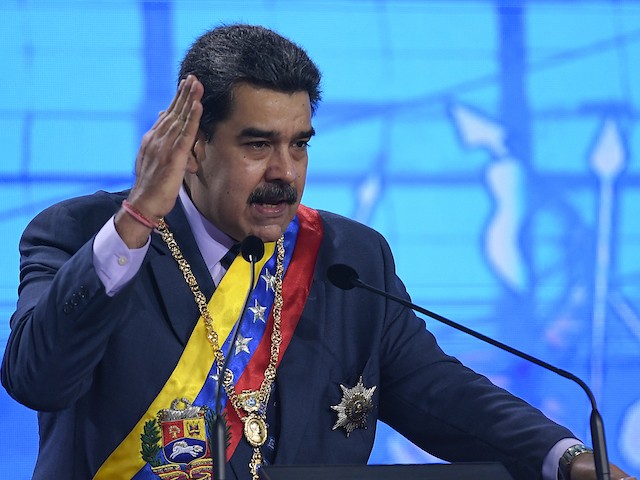Venezuelan socialist dictator Nicolás Maduro paid back years of support to Russian strongman Vladimir Putin in a televised diatribe Tuesday night accusing Ukrainian leaders of being “fascists” and declaring his regime’s “complete backing” of Putin’s ongoing military invasion of Ukraine.
Putin announced in a speech on Monday that he would recognize two separatist gangs in eastern Ukraine as the “sovereign” countries of Donetsk and Luhansk, the two regions that make up the greater Donbas of eastern Ukraine. Putin invaded Donbas in 2014 – the same year he invaded and colonized Ukraine’s Crimean peninsula – but had for years offered only weapons aid and covert support, denying any involvement in the region. On Monday, Putin claimed the newly identified countries had requested Russian military assistance and approved a formal Russian military presence in Ukraine.
While supporters of Putin’s aggression on both sides of the political spectrum claim that Russia’s actions in Ukraine are a response to alleged legitimate “security concerns” over NATO’s expansion, Putin made clear in his speech that he did not believe Ukraine was a real country, asserting, “Ukraine has never had stable traditions of their own statehood” and declaring Vladimir Lenin the “architect” of Ukraine.
Maduro joins fellow Russian client Bashar al-Assad, who remains Syria’s dictator after heavy Russian involvement in the civil war that began there in 2011, in supporting Putin’s belligerence towards his neighbor to the west.
Maduro justified his support with a convoluted argument that the government of current President Volodymyr Zelensky, who he did not name, was the result of an unspecified “coup.” In reality, Zelensky, a professional comedian with no prior political experience, defeated incumbent “Chocolate King” Petro Poroshenko in a free and fair election in 2019.
“The extremist right that has taken over the governments of Ukraine has never been interested in resolving conflicts via dialogue, has never been interested in peace, has never been interested in respecting Russia,” Maduro railed at a televised event the state propaganda outlet VTV described as a “working meeting” on Tuesday evening.
“There have been several times that President Putin has attempted direct dialogue with the governors of Ukraine to establish a base of understanding and conflict resolution,” Maduro alleged, “but the fascist elite that executed a coup d’etat in Ukraine and the groups who have taken power in Ukraine on different occasions have stayed away from diplomacy, from respect, from dialogue.”
Maduro did not clarify who the “fascist elite” who delivered the “coup” were or what events he was talking about. He did not mention Zelensky in his remarks. Maduro appeared to be, however, referring to the Maidan protests in 2014, a grassroots protest effort by the Ukrainian people to oust pro-Russian president Viktor Yanukovych. Like Maduro, Yanukovych responded to the protests with brutal violence, killing over 100 Ukrainians and injuring thousands before resigning and fleeing to Russia.
The Maidan protests resulted in the election of Poroshenko — Zelensky’s election rival in 2019, not an ally.
“What does the world want,” Maduro asked, “for Putin to stay with his hands crossed, to not act in defense of his people?”
“That’s why Venezuela announces its complete backing to President Vladimir Putin in the defense of peace of Russia,” Maduro announced, “in the defense of peace in that region, in the valiant peace of his people and his fatherland. All the support for President Putin, all the support for Russia.”
Russia has supported the illegitimate Maduro regime for years and engaged in military operations in the Caribbean islands on a semi-regular basis. In 2018, Russia placed two nuclear-capable bombers, Tupolev Tu-160 models, in the country, conducting flights over the Caribbean to boast of Russia’s ability to operate near the United States. Reports in Venezuelan media, citing Russian news agency Tass, reported that year that Moscow was preparing to establish a military base in La Orchila, a Caribbean island belonging to Venezuela.
Russian President Vladimir Putin, right, and Venezuelan President Nicolas Maduro shake hands during their meeting in the Novo-Ogaryovo residence outside Moscow, Russia, Thursday, Jan. 15, 2015. (AP Photo/Pavel Golovkin, Pool)
The next year, the Putin regime insisted it had no meaningful military presence in Venezuela.
More recently, following President Joe Biden suggesting in January that he would not take action if Putin engaged in a “minor incursion” in Ukraine, Putin made a series of phone calls to leftist leaders throughout Latin America to shore up ties.
“Russian President [sic] Vladimir Putin in his recent phone calls with the leaders [sic] of Cuba, Nicaragua and Venezuela – Miguel Diaz-Canel, Daniel Ortega and Nicolas Maduro – saw eye to eye with them on boosting strategic cooperation in all fields,” according to Russia’s Tass news agency.
Maduro ceased to be the president of Venezuela in January 2019 but maintains control of the Venezuelan armed forces and has refused to vacate Miraflores, the presidential palace, making him the de facto head of the Venezuelan state. The official, but powerless, president of Venezuela, Juan Guaidó, issued a statement on Tuesday opposing Russia’s violence in Ukraine and Russia’s presence in Venezuela generally.
“We reject the intent of using Venezuelan territory for the purposes of war,” Guaidó said in a statement, “Our role in this conflict continues to be recovering democracy in Venezuela and distancing ourselves from the intended invasion of Ukraine on the part of Russia.”
